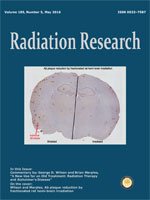A detailed understanding of the relationship between radiation-induced breast cancer and obesity is needed for appropriate risk management and to prevent the development of a secondary cancer in patients who have been treated with radiation. Our goal was to develop an animal model to study the relationship by combining two existing Sprague-Dawley rat models of radiation-induced mammary carcinogenesis and diet-induced obesity. Female rats were fed a high-fat diet for 4 weeks and categorized as obesity prone or obesity resistant based on their body weight at 7 weeks of age, at which time the rats were irradiated with 4 Gy. Control rats were fed a standard diet and irradiated at the same time and in the same manner. All rats were maintained on their initial diets and assessed for palpable mammary cancers once a week for the next 30 weeks. The obesity-prone rats were heavier than those in the other groups. The obesity-prone rats were also younger than the other animals at the first detection of mammary carcinomas and their carcinoma weights were greater. A tendency toward higher insulin and leptin blood levels were observed in the obesity-prone rats compared to the other two groups. Blood angiotensin II levels were elevated in the obesity-prone and obesity-resistant rats. Genes related to translation and oxidative phosphorylation were upregulated in the carcinomas of obesity-prone rats. Expression profiles from human breast cancers were used to validate this animal model. As angiotensin is potentially an important factor in obesity-related morbidities and breast cancer, a second set of rats was fed in a similar manner, irradiated and then treated with an angiotensin-receptor blocker, losartan and candesartan. Neither blocker altered mammary carcinogenesis; analyses of losartan-treated animals indicated that expression of renin in the renal cortex and of Agtr1a (angiotensin II receptor, type 1) in cancer tissue was significantly upregulated, suggesting the presence of compensating mechanisms for blocking angiotensin-receptor signaling. Thus, obesity-related elevation of insulin and leptin blood levels and an increase in available energy may facilitate sustained protein synthesis in cancer cells, which is required for rapid cancer development.
How to translate text using browser tools
2 May 2016
A Rat Model to Study the Effects of Diet-Induced Obesity on Radiation-Induced Mammary Carcinogenesis
Tatsuhiko Imaoka,
Mayumi Nishimura,
Kazuhiro Daino,
Takamitsu Morioka,
Yukiko Nishimura,
Hiroji Uemura,
Kenta Akimoto,
Yuki Furukawa,
Masahiro Fukushi,
Keiji Wakabayashi,
Michihiro Mutoh,
Yoshiya Shimada
ACCESS THE FULL ARTICLE

Radiation Research
Vol. 185 • No. 5
May 2016
Vol. 185 • No. 5
May 2016




